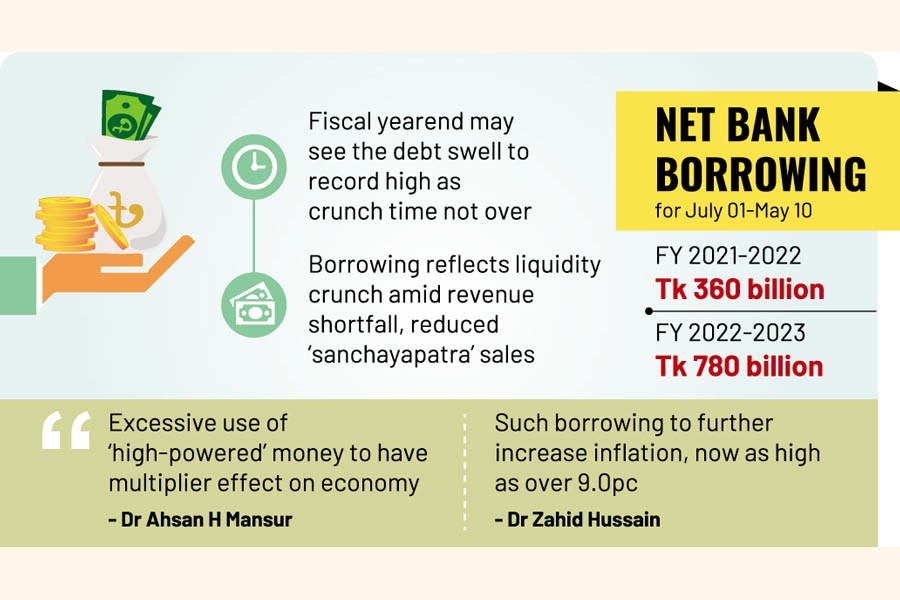
Jasim Uddin Haroon and Jubair Hasan
Published :
Updated :

Government’s bank borrowing for deficit financing has already overshot the mark to Tk 780 billion this fiscal year--despite official 'austerity'--as public spending far outstrips earnings, official statistics show.
Economists and finance officials predict the debt could swell to a record high by the fiscal yearend as crunch time caused by the pandemic and the back-to-back war in Ukraine has yet to be over.
The government borrowings for budget support surged 117 per cent during the past ten-plus months in the fiscal year (FY) 2022-23.
The net sum borrowed between July 01 and May 10 stood at Tk 780 billion in a climb from merely Tk 360 billion during the same period a year earlier, the data provided by the central bank of Bangladesh showed.
Such lavish borrowing reflects a growing cash requirement of the government and its serious liquidity crunch amid revenue shortfalls and a reduction in the sales of government 'sanchayapatra (national savings certificates)'.
In many instances in the bid operations, the government raised beyond its weekly targets that was never seen in the recent past, people involved with the bid operations told the FE.
They also said the government borrowings from the banking system for the first time in many years could cross even its upwardly revised target at Tk 1.11 trillion. The original target of borrowing from banks was Tk 1.06 trillion.
The way the dependence of public borrowing on the banking system has mounted over the last 10 months, the economists and central bank officials fear that it could reach the highest-ever level and cross the fiscal target of over Tk 1.11 trillion by June when the pressure of ADP (annual development programme) spending normally shoots up.
Net government borrowing from the banking system consists of borrowings from the central bank and scheduled banks.
From the banking system, the government borrows mainly through issuance-reissuance of Treasury Bills and Bonds, and ways and means like advances and overdraft.
Seeking anonymity, a BB official said the government borrowing from the banking system continues to grow this fiscal year mainly because of lower internal revenue collection.
As the liquidity situation in the banks is under stress for various factors, he said, the central bank does not pass on the additional pressure of public borrowing to the banks.
"That's why the BB is now funnelling cash into government coffers to mitigate banks' liquidity crunch through using 'devolvement tool'," the official said.
Of the Tk 780-billion funds, the central bank alone paid Tk 660 billion to the government up to May 10, 2023 this fiscal through buying government securities itself through the devolvement.
"If we did not go for devolvement, the money would come from the market and it would mount the liquidity stress further and would squeeze the access of credit to the private sector that we don't want," says the central banker about walking a tightrope to make do with the means in hand.
However, bankers and economists have aired fears that such excessive use of the 'high-powered' money which is equivalent to printing money would further fuel up inflation in the days ahead.
They also feel that the situation indicates that the country's all the markets (money, bond and capital) are not functioning properly.
Contacted for his view of the conundrum, executive director of Policy Research Institute (PRI) of Bangladesh Dr Ahsan H. Mansur said the central bank is now excessively using high-powered money because of the liquidity shortage in the banks.
"But this is not a proper mix of financing as it would certainly push up inflation in the coming days," he told the FE.
He notes that if the government takes Tk 1.0 trillion from the central bank, it will have "money-multiplier" effect. This means it may impact the economy around five times as per the multiplier effect.
Regarding the reasons for such a situation, the country's renowned economist, who had worked as division chief for the Middle East of the IMF, opines that such situation arises as key markets like money, bond, and capital markets are not functioning properly.
"We intervene in each market--we do it in the bond auctions to control the lending rates. "Such intervention actually distorts the market, and under such situation, the market forces cannot move independently," Dr Mansur says in observation.
Former lead economist at the World Bank's Dhaka office Dr Zahid Hussain says he BB purchased the government securities with the funds from their account, which is equivalent to the print money.
"It would further enhance risk of inflation in the country where the rate of inflation is as high as over 9.0 per cent."
He says the central bank could say that it is helping ease pressure on the overall liquidity situation. But private sector cannot import industrial raw materials under the current situation while power supply has been disrupted for lack of primary energy.
"Private sector urgently needs foreign currency, not the local currency."
The economist mentions that most countries are now following monetary- tightening measures to contain inflation, which is benefiting them.
"But, we're following expansionary policy. That's why Bangladesh is among some of the few countries where inflation is still higher."
The total revenue mobilisation in the first eight months up to February of this fiscal year amounted to Tk 2.33 trillion or 54 per cent of the annual target of Tk 4.33 trillion. The non-NBR tax collection was too poor--27 per cent of the target.
The net sales of the national savings certificates recorded negative growth at Tk 41.61 billion as the maturity payments were higher than the fresh investment. The government has tightened the investment procedures, including lowering the individual investment ceiling.
jasimharoon@yahoo.com and jubairfe1980@gmail.com


 For all latest news, follow The Financial Express Google News channel.
For all latest news, follow The Financial Express Google News channel.